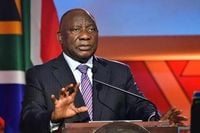In a surprising move amid strained South Africa-U.S. relations, President Cyril Ramaphosa is reportedly considering appointing an Afrikaner as the new South African Ambassador to the United States. This decision comes on the heels of heightened political tensions following the removal of former ambassador Ebrahim Rasool, who was dismissed after publicly criticizing U.S. President Donald Trump.
According to the Sunday Times, Ramaphosa and International Relations Minister Ronald Lamola are looking at four potential candidates for the ambassador role, all of whom are senior Afrikaans political figures. Among them is Roelf Meyer, a prominent figure in South Africa's history, known for his role as the Chief National Party negotiator during the Convention for a Democratic South Africa (CODESA) talks in the 1990s. Meyer and Ramaphosa developed a close friendship during these negotiations, earning them the nickname "R&R" due to their collaborative efforts in securing a peaceful transition to democracy.
Another candidate under consideration is Marthinus van Schalkwyk, the last leader of the National Party before it transformed into the New National Party. Van Schalkwyk later joined the African National Congress (ANC), where he served as Minister of Tourism and as South Africa's ambassador to Australia. Additionally, Andries Nel, the Deputy Justice Minister, and Gerhardus Koornhof, the president’s parliamentary counsellor and son of the late National Party Minister Piet Koornhof, are also on the shortlist for the position.
The reshuffle in diplomatic leadership follows Rasool's controversial comments about Trump, whom he accused of leading a global supremacist movement rooted in white victimhood. This statement sparked significant backlash and contributed to Rasool's removal from his post. As tensions between South Africa and the U.S. escalate, Ramaphosa appears to be taking a cautious approach to future diplomatic appointments.
In a related development, Ramaphosa is reportedly committed to having former Deputy Finance Minister Mcebisi Jonas lead an envoy to the U.S. However, a five-year-old video resurfacing Jonas's critical remarks about Trump has raised questions about his continued involvement. In the video, Jonas labeled Trump a "racist homophobe," which could complicate his diplomatic mission.
Although some senior ANC officials have expressed support for Jonas, others have called for Ayanda Dlodlo to lead the lobby group. Dlodlo, who previously served as a Cabinet member in South Africa, left to become an executive director at the World Bank in Washington in 2022.
The current political climate surrounding South Africa's relationship with the United States is fraught with tension. U.S. Congressman Troy Nehls has introduced the "Afrikaner Act" to Congress, which would grant Afrikaans South Africans Priority-2 refugee status. Nehls claims that Afrikaners face persecution in South Africa based on their race, ethnicity, or ancestry, particularly in light of the controversial Expropriation Act.
According to Nehls, the Expropriation Act allows the South African government to confiscate land from Afrikaners without compensation, a claim that has been met with strong rebuttals from the South African government. Officials insist that the law permits expropriation without compensation only in extreme circumstances and does not target any specific group, including Afrikaners.
Moreover, tensions have also manifested in legislative actions, such as the introduction of the U.S.-South Africa Bilateral Relations Review Act of 2025 by Congressman Ronny Jackson. This proposed legislation would empower Trump to impose sanctions on South African officials who support America's adversaries, further complicating diplomatic relations.
Jackson has accused South Africa of abandoning its relationship with the U.S. to align itself with countries like China, Russia, Iran, and groups such as Hamas. This perception of shifting allegiances has contributed to the deteriorating ties between the two nations.
Trump himself has expressed skepticism about attending the upcoming G20 summit in Johannesburg, citing concerns over the alleged land confiscation and violence against white farmers in South Africa. "They are taking the land of white farmers and then killing them and their families. The United States has held back all contributions to South Africa. Is this where we want to be for the G20? I don’t think so," Trump stated, highlighting the volatile nature of the situation.
The G20 summit, scheduled to take place in Johannesburg later this year, is expected to draw the heads of state from 19 countries, along with leaders from the European Union and the African Union. The event's significance is underscored by the ongoing tensions, making the diplomatic appointments and discussions surrounding the summit all the more critical.
As Ramaphosa navigates this complex political landscape, the appointment of a new ambassador to the United States will be a pivotal moment in shaping the future of South Africa's foreign relations. The choice of an Afrikaner ambassador reflects both the historical context of South Africa's political landscape and the current challenges facing the nation on the global stage.
In conclusion, the developments surrounding the ambassadorial appointment and the broader context of South Africa-U.S. relations illustrate the intricate balance of diplomacy, historical ties, and contemporary political realities.




